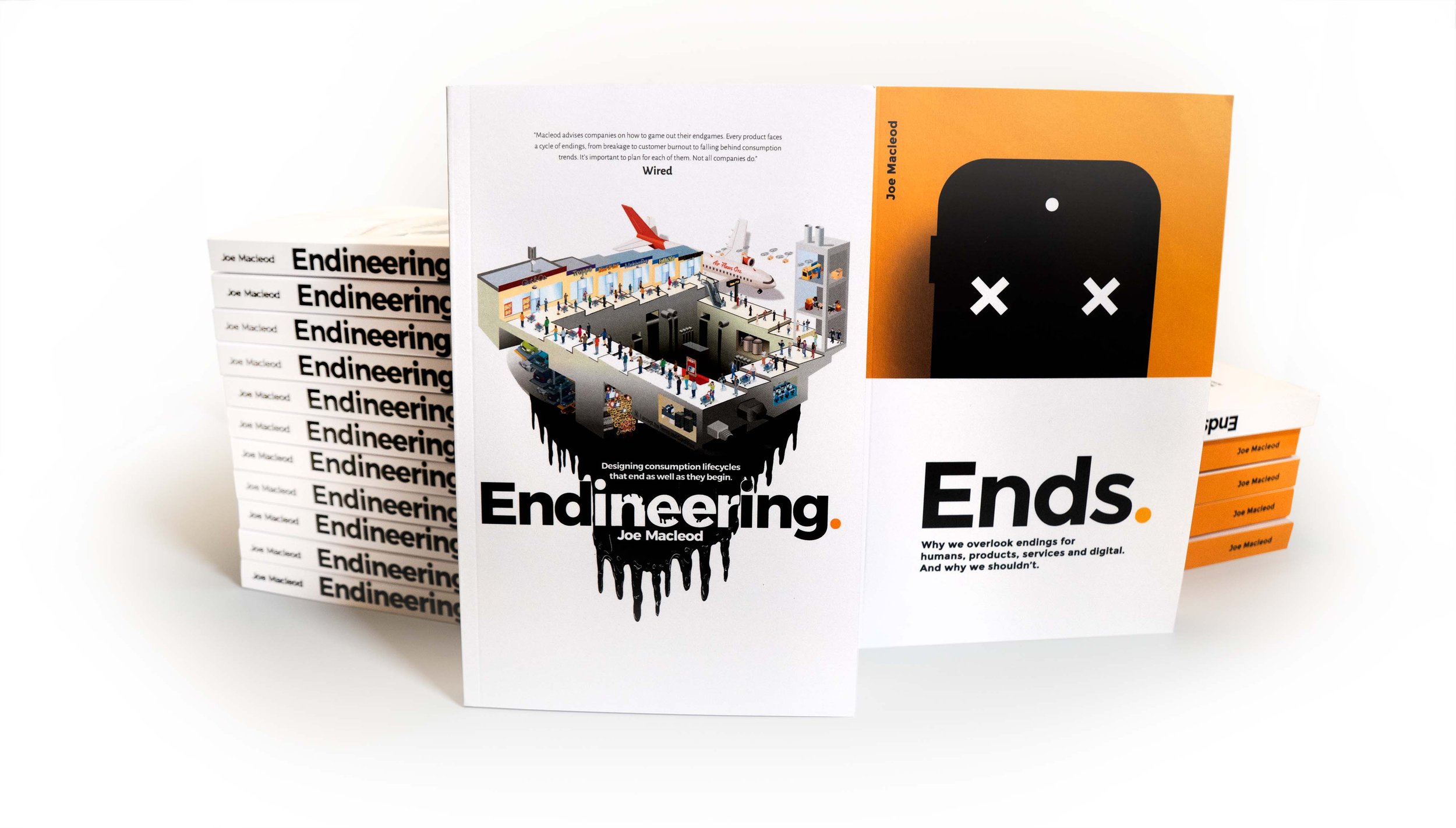Interview with Joe Macleod, Endineer Extraordinaire
Author Joe Mcleod, Head of Endineering
Joe Macleod is the founder of the world's first customer ending business. A veteran of the product development industry with decades of experience across service, digital and product sectors. Author of the Ends book, that iFixIt called the best book about consumer e-waste. And the new book Endineering, which provides tools, methods and philosophy around this new genre of practice.
The Head of Endineering at AndEnd, and TEDx Speaker, Wired describes Joe and his work thus: “An energetic Englishman, Macleod advises companies on how to game out their endgames. Every product faces a cycle of endings, from breakage to customer burnout to falling behind consumption trends. It's important to plan for each of them. Not all companies do."
We were able to catch up with Joe this month, and he shared some incredibly important insights into the self-publishing game, as well as the importance of relentless, focused and purposeful marketing.
You’ve published a couple of books now, with the most recent having been newly released, so first, a huge congratulations on the new book. Can you tell us a little about the book itself?
Thank you! Certainly. The first book, Ends (published 2017), told the story of why humans overlook endings in the consumer experience. This story has its source far back in history with the plague in Europe of the 14th century, a changing relationship with death, and the consequential changes in society. Many of which laid foundational elements for the Industrial Revolution, consumer experiences and our relationship with endings in the products, services and digital products we buy today.
The most recent book – Endineering (published November 2021) is a more instructive book. Telling the reader how to create better endings in the consumer experience. Within its pages I talk about consumer endings on many levels. From a high strategic level for audiences in policy or senior management to more practical themes for designers and product creators. Providing practical tools to help deliver better endings.
It’s a long process going from idea to finished book, and then from finished book to published book. What does your process look like once you’ve finalized the book and are ready to get it published?
Endineering Book Cover Designed by Joe Macleod
The division between done writing and start publishing isn’t a clear line. At least for me while wearing the multiple hats of bringing a book to market. To provide context here, my first degree was in graphic design. So I applied those skills to creating the layout of both books. And I also illustrated the cover for the recent Endineering book. The whole process is busy and exciting.
While I’m finalising written drafts with the editor, I am creating layout styles for pages, chapters, pictures and diagrams. Also working out what fonts I will use at what size, weight, leading and kerning. At the same time the cover art is being developed as is finalising the placement of the title, subtitle, author name on the cover. Alongside that I am getting drafts of the book and putting them in to Amazon’s KDP platform to check border sizing, page count, and costs, all while requesting the ISBN numbers from the Swedish ISBN agency – www.kp.se. It is great living in Sweden, ISBN is free. In the UK I paid a load for each one.
Amongst all this I am starting to plan ahead with events, marketing and social media. The marketing needs to be relentless, consistent and purposeful. To be honest, I am not a fan of social media. I have to really push myself to do a post. I try to aim for something posted every couple of days. Those posts are usually targeted around the book. It might be a diagram from the book, a quote, image or me talking about it in a video. You have to be slightly cautious about announcing a big launch day if your self-publishing, as the date the product is available is hard to predict. It can take up to 72 hours to be on all global platforms. So saying “It has launched!” is not a universal experience. Which removes the date announcement from your marketing opportunities.
One activity I pursued was to contact influential people in industries I think would enjoy the book. I then offered those people a read of the draft in exchange for a quote. You need to be realistic here about people’s time. Most will say they will do it and then run out of time. So you will only get about a quarter of your requests fulfilled. Quotes are really valuable to authors. For non-fiction writers, a meaningful quote can really help people imagine a book’s relevance to them and their job.
A fairly common thread in the SWF community is that many of us have dreamed of writing for years before we ever had the time, resources, or ability to sit down and actually do it. When did you first decide writing was something that you wanted to actively pursue, and then how long was it before you started writing seriously?
I didn’t want to write. In fact, I am quite dyslexic so it was never something I wanted to do. But I started looking into endings as a side interest from my regular job. I expected to write something like a Medium article or do a conference talk. As I researched more, I realised this was an important story and needed to be told. I think many authors see it like this. As something beyond wanting to and more like having to.
Effective graphic communication to help convey the messages are key.
I reluctantly started to write a draft for one chapter. That went well. Then I did another. And another. I soon had about four chapters. I then needed to start considering what a book might look like and plan the arc of the whole story. Working out what chapters would fill the gaps. What might the reader require in different chapters and what was the wider message I was telling?
Can you tell us about some of your favorite SWF moment(s) and what really stuck with you after the festivals?
I remember a talk from the founder of The Local, and how media in small countries is exploited by partisan groups in other nations. Sweden is often a target by those who manipulate a story to make an example to reinforce their own beliefs. It was shocking to see the way The Local’s articles get abused to support an extremist theme.
What would you say were the biggest takeaways for you from SWF?
I was struck by conversations with potential authors, who seemed to be pursuing endorsement of a publisher instead of getting their story out by any means. Of course for some people that is the best route. But when I was looking for a publisher I had many conversations. Few were interested in taking a risk on a new subject like creating endings in the consumer experience. I had to believe in myself and self-publish. I think that was something I reflected upon a lot after the first SWF event I went to.
Do you recall any moments that helped clarify things in a new way, or provided new insights into specific areas of the craft?
As I approached writing from being a designer first, many of the established norms of writing are quite distant to me. Going to the SWF events have been really helpful in exposing me to this new world. I am learning a wide range of techniques and approaches that I would have never discovered without attending such an event.
How have you evolved as a writer since attending your first Stockholm Writers Festival, and what part did the festival itself play in that evolution?
There are many writing exercises at the event that really helped me see writing in different ways. This I really appreciated and still use some of them to break through difficulties in writing.
Can you tell us a little about a piece you’ve written in the past that you are particularly proud of, published or not — just something that still moves you every time you revisit it?
I wrote this way back in 2016. Technically it isn’t the most wonderfully written piece, I think I am a better writer now. But what I like about this piece is its dark theme of death, in contrast with its pace and wit. Something that I am glad to get across in such an article. It is hard getting the right tone and not losing your own writing voice.
Bowie.Closure - AndEnd Blog Post: https://www.andend.co/blog/2016/1/13/bowie-closure
Overall, has attending SWF helped you in pursuing, or continuing along, the “path to published," and if so, how?
Not specifically for getting published, but it made me see the prize as my work in the public realm and the endorsement as readers liking the work.
If you plan on attending SWF22, (and we certainly hope you do) is there anything specific that you hope to learn more about this time around?
I think for me it is about becoming a better writer. I still have lots to learn and there is such a wealth of knowledge in the room at the SWF events. I get an enormous amount out of attending. I guess I’m looking forward to the surprise of what is available at SWF22.
We asked Joe to provide another short piece that he’s written — a short poem, a 100-word story, an excerpt, or something creative for inspiration, and he’s kindly included the opening lines of the introduction of Endineering:
Introduction (Endineering)
Many of us feel lost. Trapped in the oscillation between consumerism and concern. At one end are powerful short-term individualistic desires satisfied by consumerism. At the other the guilty experience of an overburdened environment and society. To improve this, we are told to consume more - buy more of the “right” things, engage more, post more images. Yet, still the world heats up, pollution increases, and social media gets more toxic. But maybe the answer isn’t in doing more? Maybe it is at the end?
You can connect with Joe Macleod on the following platforms, and hashtags:
LinkedIn: Joseph Macleod or follow AnEnd Company on LinkedIn
Twitter: @mrmacleod or follow his AndEnd Company on Twitter
Instagram: @mrmacleod and AndEnd Company on Instagram @andend.co
Hash tags: #Endineering #DesignEnds
You can also read more via his website AndEnd where you too can Become an Endineer.
Joe’s books are available for purchase at:
Endineering Book (2021)
Direct: https://www.andend.co/endineeringbook
US: https://www.amazon.com/dp/9163947838/
SE: https://www.amazon.se/dp/9163947838/
Ends Book (2017)




